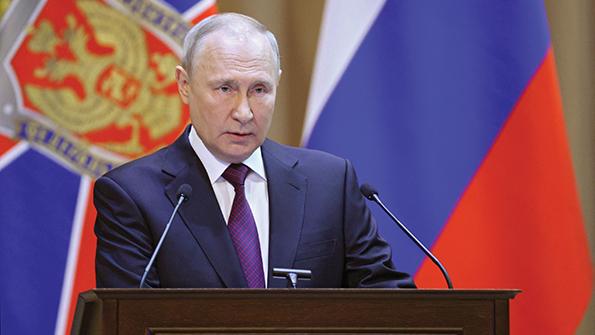Opinion: Putin’s New START Exit Does Not Increase Nuclear War Odds

President Vladimir Putin announced on Feb. 21 that Russia was “suspending” its implementation of the New START Treaty in response to U.S. and Western hostility and due to dissatisfaction with U.S. implementation of certain provisions of the treaty. Its suspension has no legitimate basis within the agreement. Russia’s reasons for ceasing implementation are spurious and not grounds for noncompliance. And its dissatisfaction in U.S. implementation stems from its own failure to negotiate adequate verification provisions.
My colleague Tim Wright and I have outlined the deeper meaning behind and implications of Russia’s decisions for bilateral, Euro-Atlantic and global security. (The short version: It’s all downside.) But an entirely unjustified argument has begun to appear in the media that Putin’s announcement heralds “a serious escalation that could mean it is preparing to use nuclear weapons in Ukraine.”
Let me be absolutely clear: Putin’s announcement does not indicate that Russia is preparing to use nuclear weapons in Ukraine. Putin does make a direct and reciprocal threat to resume nuclear testing if the U.S. does so first, but since this is extremely unlikely (at least while President Joe Biden is in office), we should not expect testing anytime soon.
Nonetheless, we need to unpack a thing or two. First, Putin is signaling that Russia would like to resume full-scale nuclear testing. Indeed, there are indications that Russia has been conducting very small-scale nuclear tests despite its pledge under the Comprehensive Test Ban Treaty of 1999 to never conduct any tests whatsoever. Fears are warranted that Russia will build new types of warheads for its “novel” nuclear delivery systems, which, if you follow a certain logic, would require nuclear tests to have high confidence in new designs.
Second, even if Russia were to resume nuclear testing, it would not indicate an escalation related to Ukraine. If Russia wanted to use nuclear weapons in Ukraine, testing prior to use is unnecessary. Russia has all the warheads it needs (and more) should it choose to carry out tactical or theater-level nuclear strikes in Ukraine. Russia also has more than enough capability to perform a nondestructive assay of its warheads to ensure their viability and usability. Skepticism that Russia will use nuclear weapons in Ukraine is not borne from a lack of confidence in the condition of Russian warheads: Most experts know that Russia has the credibility both in terms of systems and a willingness to commit violent acts. Rather, there is no viable use case where Russia would plausibly use nuclear weapons.
And so, point three: No use case exists for nuclear weapons in Russia’s war on Ukraine now. As Fabian Hoffmann and I argued in March 2022, and I argued again in October of last year, the costs of Russian nuclear weapons use in Ukraine remain too high, and the benefits are too low to justify their use. In fact, there is more evidence today—based on statements by Indian President Narendra Modi and Chinese President Xi Jinping—that our predictions last year were correct. India and China are loathe to tolerate nuclear escalation in Russia’s war on Ukraine. And to forestall the inevitable retort, no, Putin is not irrational. He is rational and predictable. He makes terrible choices, but they are eminently predictable if you are paying attention. Regime preservation is Putin’s highest aspiration, and nuclear weapon use in Ukraine is the one way he could guarantee a global coalition that would question his hold on power.
All of this is not to argue that the U.S. and the West should not do more to send deterrence messaging to Moscow. Indeed, it would be wise to continue reminding Russia that nuclear arms use in Ukraine would risk direct U.S. and NATO military involvement in the conflict. Moreover, the West should engage in more robust diplomacy with India and China and other states in the Global South to build a unified front against Russian nuclear arms use or threats of use against Ukraine.
Some in the Global South have taken a blase attitude toward Russian nuclear threats. We should galvanize them against Russia’s irresponsible rhetoric and build a truly global coalition to agree—in more than a strongly worded condemnation in the U.N. General Assembly—that action would be needed in the event of their use.
Russia remains very unlikely to use nuclear weapons against Ukraine, regardless of its abandonment of the New START Treaty, its empty nuclear threats and even if it resumes nuclear testing.
William Alberque is the director of strategy, technology and arms control for the International Institute for Strategic Studies.
The views expressed are not necessarily those of Aviation Week.




